October
Guest Chef: Damon Lee Fowler at
Cooks'Wares
|
Join us in
welcoming Damon Lee Fowler to
Cooks'Wares! Damon will delve deep into the heart of Southern
cuisine, giving you the real flavor of the South in these two
classes:
(Click the Class Title
for a link to the full description on the
website).
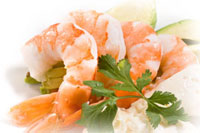 Monday,
October 27 - "Classic Southern
Cuisine" at Harper's Point from 6:30 -
9:00pm - With Damon's usual wit and humor, these comforting,
traditional dishes will please all your senses! Monday,
October 27 - "Classic Southern
Cuisine" at Harper's Point from 6:30 -
9:00pm - With Damon's usual wit and humor, these comforting,
traditional dishes will please all your senses!
- Savannah Black Bean Soup
- Sherried Shrimp
- Steamed Rice
- Green Beans and Mushrooms with Caramelized Onions
- Ginger Ice Cream
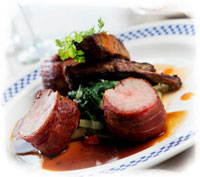 Tuesday,
October 28 - "True Southern
Hospitality" at Settlers' Walk from 6:30 -
9:00pm - This tantalizing collection of mouthwatering recipes
will bring the warmth and graciousness of the South to any kitchen.
Come celebrate the rich flavors and culinary influences that make
Southern food uniquely delicious! Tuesday,
October 28 - "True Southern
Hospitality" at Settlers' Walk from 6:30 -
9:00pm - This tantalizing collection of mouthwatering recipes
will bring the warmth and graciousness of the South to any kitchen.
Come celebrate the rich flavors and culinary influences that make
Southern food uniquely delicious!
- Three Mushroom Consommé
- Pork Tenderloin Medallions with Sage and Madeira
- Walter Dasher's Celery Root Mashed Potatoes
- Braised Broccoli, Georgia Style (with bacon and onions)
- Pineapple Charlotte
Be sure to listen when Damon Lee
Fowler visits with Marilyn Harris
on WKRC
this Saturday,
October 11 from 1 - 4pm. Also, watch for his
television appearance next Spring with Paula
Deen!
 Damon Lee
Fowler is a nationally recognized authority on Southern
cooking and its history. He was born in north Georgia and raised in
upstate South Carolina. After receiving a Master of Architecture
from Clemson University, he practiced architecture for more than a
decade before turning to food writing, teaching, and culinary
history. He is the author of six critically acclaimed cookbooks:
Classical Southern Cooking: A Celebration of the Cuisine of the Old
South which was nominated for two Julia Child cookbook awards
(including the Jane Grigson award for scholarship) and a James Beard
Foundation award; Beans, Greens, and Sweet Georgia Peaches; Fried
Chicken: The World's Best Recipes; Damon Lee Fowler's New Southern
Kitchen; Damon Lee Fowler's New Southern Baking and, most recently,
The Savannah Cookbook. He lives in Savannah, where aside from his
work as a food writer, lecturer, cooking teacher, and culinary
historian, he is the featured food writer for the Savannah Morning
News. He is presently working on two novels, a short story
collection, and a revised edition of Classical Southern
Cooking. Damon Lee
Fowler is a nationally recognized authority on Southern
cooking and its history. He was born in north Georgia and raised in
upstate South Carolina. After receiving a Master of Architecture
from Clemson University, he practiced architecture for more than a
decade before turning to food writing, teaching, and culinary
history. He is the author of six critically acclaimed cookbooks:
Classical Southern Cooking: A Celebration of the Cuisine of the Old
South which was nominated for two Julia Child cookbook awards
(including the Jane Grigson award for scholarship) and a James Beard
Foundation award; Beans, Greens, and Sweet Georgia Peaches; Fried
Chicken: The World's Best Recipes; Damon Lee Fowler's New Southern
Kitchen; Damon Lee Fowler's New Southern Baking and, most recently,
The Savannah Cookbook. He lives in Savannah, where aside from his
work as a food writer, lecturer, cooking teacher, and culinary
historian, he is the featured food writer for the Savannah Morning
News. He is presently working on two novels, a short story
collection, and a revised edition of Classical Southern
Cooking. |
| October
Cooking Classes |
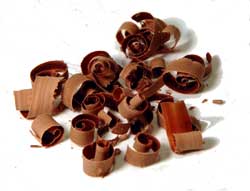
Tue, Oct 14 - Haute Chocolate
with Lisa Cooper-HolmesHarper's Point from 6:30 -
9:00pm. $45 Class
Full! (Space available at Settler's Walk, Wed, Oct 15)
Wed, Oct 15 -
Haute Chocolate
with Lisa Cooper-Holmes
Settlers' Walk from 6:30 -
9:00pm. $45
(Also offered Tue, Oct 14 at Harper's Point).
Wed, Oct 15 -
Autumn in Provence
with Marilyn Harris
Harper's Point from 6:30 -
9:00pm. $65 - Class
Full!
Thu, Oct 16 -
Everyday Gourmet
with Edward Stanziano
Settlers' Walk from 6:30 -
9:00pm. $45
Sat, Oct 18 -
New Fall Apple Favorites with Leigh Ochs
Harper's Point from
11:00am - 1:30pm. $45
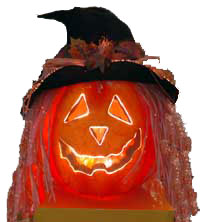 Sat, Oct 18 - A Haunting Halloween Party for Ages 6-8 with Lorraine
Gose Sat, Oct 18 - A Haunting Halloween Party for Ages 6-8 with Lorraine
Gose
Settlers' Walk from 11:00am -
1:00pm. $35
Mon, Oct 20 -
Appetizers by Chef Paul with Paul Dagenbach
Harper's Point from
6:30 - 9:00pm. $50
Class
Full! Also offered Mon, Nov 17 at Settler's Walk.
Thu, Oct 23 -
Eat Well's 'Goodies' from Scratch with Renee Schuler
Harper's Point from
6:30 - 9:00pm. $40
Thu, Oct 23 -
Meadowlark Salad Secrets
with Elizabeth Wiley
Settlers' Walk from 6:30 -
9:00pm. $40
Sat, Oct 25 -
Funny Holiday Treats for Ages 6-8 with Ruth Cammerer & Ann
Nofziger
Harper's Point 11:00am - 1:00pm.
$35
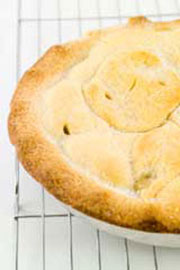 Sat, Oct 25
- Pies, Tarts and Turnovers Made Easy with Todd Davis Sat, Oct 25
- Pies, Tarts and Turnovers Made Easy with Todd Davis
Settlers' Walk from
12:00 noon - 2:30pm. $40
Mon, Oct 27 -
Classic Southern Cuisine with Damon Lee Fowler
Harper's Point from
6:30 - 9:00pm. $70
Tue, Oct 28 -
True Southern Hospitality with Damon Lee Fowler
Settlers' Walk from
6:30 - 9:00pm. $70
Tue, Oct 28 -
Perfect Pies with
Jessica Zimmerman & Michael Andresen
Harper's
Point from 6:30 - 9:00pm. $40
Wed, Oct 29 -
Time Saving, Energy Saving Cooking with Lori Cole
Harper's Point from
6:30 - 9:00pm. $35
(Also offered Thu, Oct 30 at Settlers'
Walk).
Thu, Oct 30 -
Time Saving, Energy Saving Cooking with Lori Cole
Settlers' Walk from
6:30 - 9:00pm. $35
(Also offered Wed, Oct 29 at Harper's
Point)
3 Ways to Register: On-Line, In
Store, or by Phone
Harper's Point classes - Call
513-489-6400 Settlers' Walk classes - Call
937-748-4540 10%
Discount on merchandise purchases on
the day you attend class! (excluding kitchen
electrics). |
Fillo,
Phyllo, Filo
|
No matter which
way you spell it, fillo dough is magic material for any cook eager
to add a little panache to a presentation. Pronounced "fee-low," this unique pastry dough
originates from the Greek word for "leaf," and is common in Eastern
Mediterranean countries: Greece, Turkey, Lebanon, Armenia and
neighboring areas. Made of flour, water, and a little oil, the
dough is rolled into impossibly thin sheets. The sheets are
brushed with oil or butter, stacked and filled with any number of
mixtures. Sheets of fillo are literally paper-thin. Homemade
fillo remains a mystery to us, but thanks to commercial rolling
machines the delicacy is accessible to all of us.
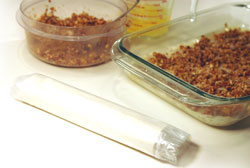 Finding Fillo - Fillo dough is
found in the frozen food section of the market typically in long
narrow boxes near the frozen puff pastry. A one-pound box will
hold approximately 40 sheets of fillo each about 9 x 13 inches in
size. Various brands may have different sizes and different
sheet counts. The thickness of the dough is designated by a number
with "#7" being the most widely available. The sheets are
frozen in a loose, flat roll and sealed in a plastic sheath inside
the box. Finding Fillo - Fillo dough is
found in the frozen food section of the market typically in long
narrow boxes near the frozen puff pastry. A one-pound box will
hold approximately 40 sheets of fillo each about 9 x 13 inches in
size. Various brands may have different sizes and different
sheet counts. The thickness of the dough is designated by a number
with "#7" being the most widely available. The sheets are
frozen in a loose, flat roll and sealed in a plastic sheath inside
the box.
Prepping the
Fillo - Allow the fillo to thaw completely before opening its
plastic wrap. Thawing may be accomplished overnight in the
refrigerator, or by setting on the countertop for 3-4 hours.
Thawed, unopened fillo dough may be kept in the refrigerator for up
to 2 weeks.
Mise
en place - Have everything in place before cracking the seal
on the fillo dough. Prepare the filling, ready and oil the
baking pans, melt the butter, and arrange the required
utensils. 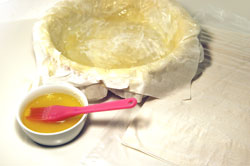 Once the assembly of your fillo creation
begins, time is of the essence! Take a minute, think through
everything you'll need. Once the assembly of your fillo creation
begins, time is of the essence! Take a minute, think through
everything you'll need.
Handling the
Dough - The trick to working with fillo dough is to keep it
from drying out while assembling your dish. Once the roll of
fillo has been unfurled, cover the stack with a damp towel at all
times. Take care to see that the edges of the stack are
covered as they seem to dry out especially quickly.
Layering
On - Tease one sheet of fillo from the stack and place in the
bottom of your oiled baking pan. Brush olive oil or butter on
the fillo sheet with a soft bristle brush and a light touch.
It's not necessary to cover every inch of the fillo with the oil,
just apply random strokes. Place a second sheet on top, brush with
oil or butter, and repeat using a total of six to eight sheets for
the bottom of a one-pie preparation. Spread your prepared filling on
top. Top the filling with another six to eight sheets layering
one at a time and brushing each with oil or butter. Take care
to oil the edges of the fillo dough so that they do not curl
excessively during baking. Follow your recipe for the number
of filling layers and fillo sheets. Sweet fillo dishes
generally have more interspersed layers than savory fillo
dishes.
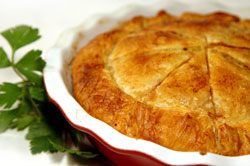 Score
Before - After a complete brushing of the top fillo layer,
score the first several layers of dough according to your cutting
plan with your sharpest knife. Take care to avoid cutting
through all of the dough layers and exposing the filling which might
bubble up and potentially disturb the final appearance. Score
Before - After a complete brushing of the top fillo layer,
score the first several layers of dough according to your cutting
plan with your sharpest knife. Take care to avoid cutting
through all of the dough layers and exposing the filling which might
bubble up and potentially disturb the final appearance.
Bake Until
Golden - Fillo dough prefers a moderately hot oven, 350 - 400
F. The higher temperatures will turn the pastry a beautiful
golden color while preventing the dough from getting soggy.
|
Flair with Fillo
|
The lovely
thing about fillo is its versatility. Fillo is to the cook,
like clay is to the artist; it can be shaped, cut, folded, and
sculpted into heavenly food that melts in your mouth and satisfies
every taste bud. Fillo dough is perfect for appetizers, main
entrees, and desserts, (though perhaps not all in the same evening .
. . ). Once you've mastered the basics of working with fillo, here
are some ideas to try:
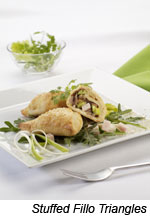 Shapes and Sizes - The easiest use
of fillo is in a one pan scenario. As described above, full
sheets are layered in a large baking pan or sheet pan. Layered
full sheets will produce a stunning result, but some additional fun
may be had by cutting shapes, or folding the fillo dough into
perfectly sized portions. Two customary individual
preparations include "cigars" and "triangles." Other shapes
are limited only by the imagination. Shapes and Sizes - The easiest use
of fillo is in a one pan scenario. As described above, full
sheets are layered in a large baking pan or sheet pan. Layered
full sheets will produce a stunning result, but some additional fun
may be had by cutting shapes, or folding the fillo dough into
perfectly sized portions. Two customary individual
preparations include "cigars" and "triangles." Other shapes
are limited only by the imagination.
- Cigar shape -
Use half of a sheet of fillo, cut lengthwise. Place the
filling along one end, tuck the sides in, and roll the "cigar"
into a tube. Place cigars side-by-side in a baking pan,
brush and bake.
- Triangles -
Use one sheet of fillo dough, oil, then fold in half
lengthwise. Place filling at one end in one corner. Fold the
strip in flag fashion to form a triangle. Brush the top and
edges with oil and position on a baking sheet.
- Cups - Layer
four to six sheets of fillo brushing with oil between each
layer. Cut the sheets into perfect squares and tuck into a
muffin tin matching the square size with the size of muffin
tin. Use mini-muffin tins for appetizer fillings; regular
muffin tins for an entrée or first-course.
- Other shapes -
Deploy a sharp, metal-edged cookie cutter to cut circles, hearts,
or your favorite shape. Alternatively, use a sharp knife to
cut around a template. As above, start with a stack of four
to six sheets of oiled fillo.
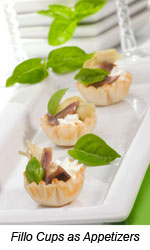 Appetizers - Folded or
rolled, fillo provides the perfect packet for a host of
appetizers. Try these variations served on your best serving
tray: Appetizers - Folded or
rolled, fillo provides the perfect packet for a host of
appetizers. Try these variations served on your best serving
tray:
- Mushroom
triangles - Using the flag fold, fill the fillo with a
mixture of sautéed mushrooms and seasoned bread crumbs moistened
with melted butter.
- Spanakopita triangles - Again using
the flag fold, place a portion of the spinach and feta mixture in
the recipe below in the triangles.
- Crab-filled
Cups - Use squares or circles in muffin cups, pre-bake the
fillo cups. Fill with a mixture of crab meat, cream cheese, lemon
juice, chives and tarragon
- Artichoke Cups
- Use squares or circles in muffin cups and fill with a dollop of
the following mixture: 1 can artichoke hearts chopped, 1 cup of
mayonnaise, 1 cup of grated Parmesan cheese. Bake for 20-30
minutes or until golden.
Entrees - Fillo will
not disappoint as a centerpiece entrée. Try a variety of
one-pie preparations or individual servings:
- Chicken Cordon
Bleu - Take the classic flavors of chicken (previously
cooked or grilled), prosciutto, and Gruyere cheese and mix into a
chunky filling. Using four sheets of fillo, place enough
filling for one serving and roll, tucking in the sides. Bake
packets with seam-side down and the tops brushed well with butter.
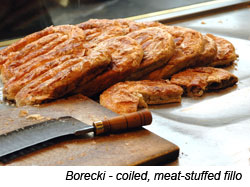 Shepherd's Pie - Layer
small chunks of cooked beef, mashed potatoes, and vegetables in
between layers of fillo dough and bake. Use a springform pan
to easily transfer the baked pie to a serving platter. Shepherd's Pie - Layer
small chunks of cooked beef, mashed potatoes, and vegetables in
between layers of fillo dough and bake. Use a springform pan
to easily transfer the baked pie to a serving platter.
- Quiche - Layer
six to eight sheets of fillo in a pie plate. Trim fillo sheets
inside the plate's edge. Brush the edges of the fillo well. Fill
with your favorite quiche recipe.
- Deep-Dish Pizza
Pie - Layer six to eight sheets of fillo in a deep-dish
pizza pan or baking dish. Fill with very well-drained canned
tomato chunks, finely diced mozzarella cheese, sliced and
quartered pepperoni, or cooked sausage, and liberal seasonings of
oregano, basil and black pepper. Top with another six to
eight sheets of fillo, score and bake.
Desserts - You'll have
a fine finish to any meal with a fillo-based dessert! Try both
filling and baking fillo desserts, or just pre-baking fillo
shells:
- Baklava - This classic never fails to please. See the
recipe below for getting started. Try some of your own
variations by changing the type of nut mixture used and applying
different syrup flavors.
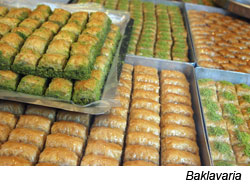
- Mousse Cups - Pre-bake fillo cups as described above and fill
with your choice of mousse and miniature garnish.
- Rustic Fruit Pies - Substitute layers of fillo dough for pie
crust in making a rustic pie. Fold over the edges of the
fillo dough on top of the filling. Use a thick filling for best
results.
- Sweet Cigars - Using the cigar rolling method described above,
fill with your favorite chocolate chunks and roasted, chopped
nuts. Form a tight roll, bake, and allow to cool before
serving.
|
If You Had
to Choose . . .
|
We posed the
following scenario to our team of experts and here's how they
responded:
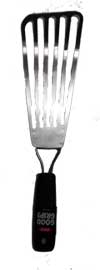 You've been sent to the Greek Islands to
represent us in a cooking extravaganza. The menu you'll be
preparing is a surprise; you need to be ready for anything.
You have your favorite knives with you and your best stirring spoon.
You're allowed to bring only one other utensil with you. What
one utensil from your kitchen would you not be able to live
without? You've been sent to the Greek Islands to
represent us in a cooking extravaganza. The menu you'll be
preparing is a surprise; you need to be ready for anything.
You have your favorite knives with you and your best stirring spoon.
You're allowed to bring only one other utensil with you. What
one utensil from your kitchen would you not be able to live
without?
Paul
- With my favorite 3 qt saute pan, I'm ready for
anything.
Sue - I'd
take a long the longest tongs I have! You can stir, turn,
serve with tongs -- very versatile!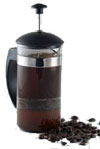
Bob - Since we'll be on islands,
I'm sure the menu will include some sort of seafood -- I'll bring by
fish turner, slotted and long enough to easy turn or serve perfect
fillets. Or, maybe I should bring some wine. . . .
Mary - My French
Press comes with! Must have
coffee! |
Smart
Fillo Tips
|
Tip #1: Fillo dough is low in
fat. Substitute fillo dough for pie crust or puff pastry and achieve
a lower calorie treat with all of the taste and elegance you desire
in a dessert.
Tip
#2: Generally, use olive oil or a combination of olive
oil and butter in savory fillo dishes, and butter for dessert fillo
dishes.
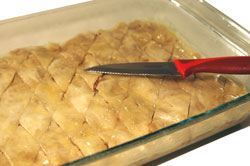 Tip
#3: Loosely roll up any leftover fillo sheets, wrap the
log well in plastic wrap and refrigerate for up to two
weeks. Tip
#3: Loosely roll up any leftover fillo sheets, wrap the
log well in plastic wrap and refrigerate for up to two
weeks.
Tip #4:
Use a serrated knife for scoring the fillo dough before baking and
for cutting after baking to easily cut through the layers without
crushing the pastry. A serrated tomato knife is perfect in
this situation - a sharp edge, pointed tip, and not as unwieldy as a
serrated bread knife. |
Q & A
|
 Q: My fillo sheet has torn, should I
discard it and start over? Q: My fillo sheet has torn, should I
discard it and start over?
A: Fillo dough is delicate,
no question. It's not uncommon for a sheet to tear or somehow
get a hole in it. Just use that sheet for an inner layer in
your fillo creation. The edges of the tear can be "glued" to
each other or to other layers with just a bit of brushed butter or
oil. Save your best sheets of fillo for the top, "show"
layer.
Q: My fillo pie
turned out soggy, what should I have done
differently?
A: Fillo is magical, but it
does have limits when it comes to overly moist or liquid
fillings. First, use fillings that are thick and tend to hold
their shape on their own. Secondly, brush the layer of fillo
in contact with the filling more thoroughly with the oil or butter;
this will help to seal the fillo from moisture. Thirdly, use a
moderately hot oven when baking your fillo dish. This will
help to crisp the fillo before it has a chance to get soggy or
saturated.
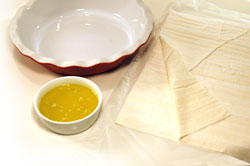 Q:
Why do my sheets of fillo crack when I unroll them? Q:
Why do my sheets of fillo crack when I unroll them?
A: This may be happening for
a variety of reasons. First of all, make sure the fillo is
thoroughly thawed. Secondly, if the fillo has been thawed in
the refrigerator, allow it to stand at room temperature for 30
minutes to fully relax. Thirdly, the fillo may have sat on the
freezer shelf too long. Check the expiration date on the
package prior to purchasing - fresh is best!
Q: Why are the tops of my fillo
crusts speckled with brown specks?
A: Use clarified butter when
brushing the fillo sheets. The white milk proteins that
precipitate when butter is melted will brown more quickly than the
pastry sheets. The result is a finished product with brown
speckles and not the desired evenly golden color. Also, if the
fillo sheets have a lot of excess flour, brush it away as you create
the layers. |
Cookbook
Review
|
The Olive and
The Caper by Susanna Hoffman. Published by Workman
Publishing Company, New York, N.Y. Copyright
2004.
We've found another enchanting cookbook!
Surprise, surprise! Despite our bias toward "all things food," this
book took us places -- places we dream of realizing in person, but
satisfying, for the moment, our wanderlust. 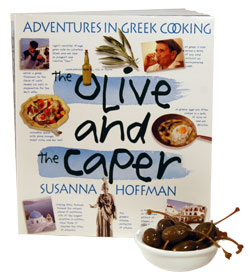 While clearly a cookbook, this tome also serves
as a travel guide and Greek history lesson at the same time.
With Ms. Hoffman's guidance, we are taken by the hand and guided
through the various regions of Greece while being educated on the
dishes of each distinctive culture. From the Peloponnesos, to
the Ionian Islands, and the outlying Cyprus and Crete, the culinary
traditions are captured in recipes accessible to the non-native,
stateside adventurer. Each of the sixteen chapters covers an
essential aspect of the Grecian diet including: meze (small bites),
savory pies, breads, salads, the vegetable parade, meat, sauces,
toppings and marinades, and, of course, sweets. As we made the
recipes noted below, for a moment we thought we were there! Maybe
next year. . . . Until then, exploring this book isn't a bad
substitute! While clearly a cookbook, this tome also serves
as a travel guide and Greek history lesson at the same time.
With Ms. Hoffman's guidance, we are taken by the hand and guided
through the various regions of Greece while being educated on the
dishes of each distinctive culture. From the Peloponnesos, to
the Ionian Islands, and the outlying Cyprus and Crete, the culinary
traditions are captured in recipes accessible to the non-native,
stateside adventurer. Each of the sixteen chapters covers an
essential aspect of the Grecian diet including: meze (small bites),
savory pies, breads, salads, the vegetable parade, meat, sauces,
toppings and marinades, and, of course, sweets. As we made the
recipes noted below, for a moment we thought we were there! Maybe
next year. . . . Until then, exploring this book isn't a bad
substitute! |
Recipes
|
Recipes excerpted from The Olive and
The Caper by Susanna Hoffman. Published by Workman
Publishing Company, Inc., New York, N.Y. Copyright 2004.
Reprinted with permission. All rights
reserved.
Classic
Spinach Pie
(Spanakopita)
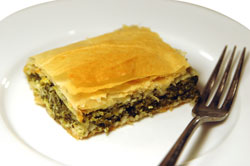 If you've had spanakopita, this version will
bring forward the best of memories. If you're new to this
spinach pie, you'll be more than delighted. The combination of
feta and spinach blend into a delicious filling surpassed only by
the buttery layers of fillo. We baked the pie in a rectangular
fashion this time around, but this filling would easily fit into
individually folded triangles for a petite, appetizer version of
this classic. If you've had spanakopita, this version will
bring forward the best of memories. If you're new to this
spinach pie, you'll be more than delighted. The combination of
feta and spinach blend into a delicious filling surpassed only by
the buttery layers of fillo. We baked the pie in a rectangular
fashion this time around, but this filling would easily fit into
individually folded triangles for a petite, appetizer version of
this classic.
Click here to view the full
recipe.
Click here for a printable version of
the recipe.
Leek, Potato,
and Olive Pie
(Prassopita)
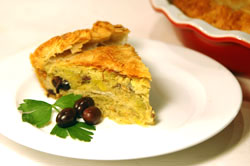 We baked this recipe in our deep pie
dish. The quintessential pairing of leeks and potatoes reigns
once again! The olive pieces give just the right amount of
interest. Using the fillo dough as a crust, we trimmed the
edges to the pie plate and curved them inward. The pie could
not have turned out better. Definitely a keeper for the recipe
box! We baked this recipe in our deep pie
dish. The quintessential pairing of leeks and potatoes reigns
once again! The olive pieces give just the right amount of
interest. Using the fillo dough as a crust, we trimmed the
edges to the pie plate and curved them inward. The pie could
not have turned out better. Definitely a keeper for the recipe
box!
Click here to view the full
recipe.
Click here for a printable version of
the recipe.
Baklava
(with Clove and Orange
Liqueur Syrup)
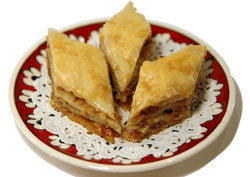 The words, "melt in your mouth," don't do
justice to what happens when a piece of this baklava passes your lips!
The delicate, crunchy layers encase the buttered nuts. The clove and
orange flavors entwine in the most subtle of ways, nothing
overpowering, just perfumed perfection. The syrup-soaked pieces are
cut in diamonds for a reason - each morsel is a gem! The words, "melt in your mouth," don't do
justice to what happens when a piece of this baklava passes your lips!
The delicate, crunchy layers encase the buttered nuts. The clove and
orange flavors entwine in the most subtle of ways, nothing
overpowering, just perfumed perfection. The syrup-soaked pieces are
cut in diamonds for a reason - each morsel is a gem!
Click here to view the full
recipe.
Click here for a printable version of
the
recipe.
| |